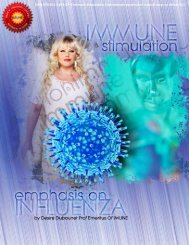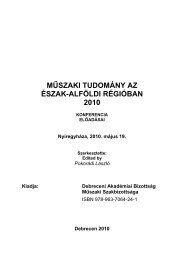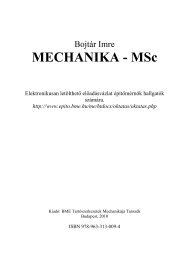Create successful ePaper yourself
Turn your PDF publications into a flip-book with our unique Google optimized e-Paper software.
(xii) Green PH, Jabri B. Coeliac disease. Lancet. 2003 Aug 2;362(9381):383-91. Review.<br />
Gluten Dangers: The Truth Is Here To Stay<br />
If you’re gluten sensitive or have celiac disease you may have heard the comment that gluten<br />
is a “fad” from a curious friend or family member. Granted one would have to be quite “out of<br />
the loop” these days to not have heard of gluten, but more and more those who haven’t been<br />
diagnosed are asking: Why now? Why is it suddenly so large a problem?<br />
These are good questions and I’d like to provide some possible answers.<br />
Recently I had the good fortune to listen to Dr Harris, a celiac and gluten researcher out of the<br />
University of Maryland who works with Dr Fassano, a long time researcher in the field. Dr Harris<br />
felt that increased awareness and better detection of celiac disease has definitely gone a long way<br />
towards diagnosing more of those afflicted. (Considering there are over 90% of celiacs who remain<br />
undiagnosed, we obviously still have a long way to go but any improvement is appreciated.)<br />
Dr Harris additionally noted that viruses and vaccines can perhaps cause an increased reaction to<br />
gluten in susceptible individuals. Viruses have been identified that trigger an immune response<br />
that cross reacts with gluten through molecular mimicry. Rotavirus is such an example. Rotavirus<br />
typically strikes children causing them to suffer with diarrhea for several days and is the most<br />
common cause of childhood diarrhea. The virus works by attacking the lining of the small intestine,<br />
causing often copious loss of fluids and electrolytes. Antibodies in celiac patients are known to<br />
cross react with rotavirus.<br />
What does this all mean? We review this mechanism in our book The Gluten Effect. Remember<br />
that gluten is a protein (actually an array of proteins but we’ll discuss that later). It is known that<br />
certain fragments of the gluten proteins are quite similar to structures within our body as well as<br />
that of viruses. The rotavirus has such a structure. When the body has been exposed to rotavirus<br />
the immune system remembers it. Due to gluten’s similar structure, gluten ingestion occurring<br />
after the viral infection causes the body’s immune system to attack the gluten molecule “thinking”<br />
it’s the rotavirus again. In sum, this infection causes the immune system in the gluten susceptible<br />
individual to be primed to react.<br />
My research revealed that rotavirus affects 3 million people in the US each year, 5 every minute.<br />
What about the vaccine comment? The number of vaccines that our children are exposed to has<br />
increased dramatically over the past several decades. Based on the above mechanism of molecular<br />
mimicry a susceptible GI tract can begin reacting to gluten after receiving a vaccine.<br />
How does one explain the genetically susceptible individual who seems to eat gluten with<br />
impunity? Dr Harris’ research is looking at a co-variable concept that I believe, based on my<br />
clinical experience, makes a lot of sense. It is thought that while an individual can possess the<br />
genes that make him or her susceptible to reacting to gluten, the reason not everyone does and<br />
the age of onset is so variable is dependent upon the presence of other factors. Dr Harris thinks<br />
that without some underlying inflammation already present in the gut, a healthy individual might<br />
go on consuming gluten with no negative effects.<br />
It is an interesting theory. What we see here in the clinic is a varying time of onset of symptoms.<br />
While someone has been consuming gluten their whole life, they may have been “fine” until their<br />
30s, 40s or 50s. And then there are the infants whose first exposure causes dramatic results. The<br />
time of expression may very well be dependent upon the underlying health and stability of the<br />
immune system. A stable, healthy, uncompromised immune system and small intestine could well<br />
sustain a gluten-containing diet with no apparent negative results. It’s not unusual for a patient<br />
to have suffered a severe infection of some sort or a stressful life period, after which they began<br />
to react to gluten.<br />
And finally the structure of our grains was discussed as it relates to different cultivars containing<br />
different protein fragments. Some fragments of proteins are inflammatory and some are not.<br />
Witness the Americans who travel to Italy and eat older cultivars of wheat with seeming impunity.<br />
Don’t book a flight just yet…<br />
There is a lot more to learn and that’s a tremendous understatement. But as a clinician I do find<br />
that the health of the small intestine and immune system plays a large role in how quickly a patient<br />
will see a resolution of their symptoms. And it also give credence to the protocol we follow that<br />
goes beyond simply removing gluten from the diet. Concurrent with a gluten-free diet one must<br />
heal the gut, remove pathogens, recolonize with healthy probiotic bacteria and follow a healthy<br />
diet – otherwise the result will be unsatisfactory.<br />
There is much more to come on this topic and to answer the question: No, gluten sensitivity is not<br />
a fad!<br />
By Mayo Clinic staff<br />
Definition<br />
Gluten-free diet<br />
A gluten-free diet is a diet that excludes the protein gluten. Gluten is found in grains such as<br />
wheat, barley and rye.<br />
A gluten-free diet is used to treat celiac disease. Gluten causes inflammation in the small intestines<br />
318 319

















